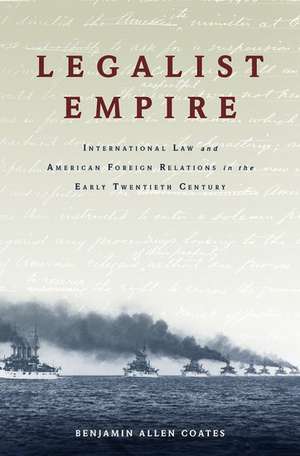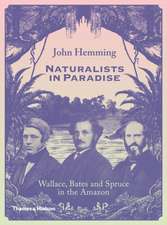Legalist Empire: International Law and American Foreign Relations in the Early Twentieth Century
Autor Benjamin Allen Coatesen Limba Engleză Hardback – 4 aug 2016
| Toate formatele și edițiile | Preț | Express |
|---|---|---|
| Paperback (1) | 196.81 lei 32-37 zile | |
| Oxford University Press – 25 apr 2019 | 196.81 lei 32-37 zile | |
| Hardback (1) | 320.53 lei 32-37 zile | |
| Oxford University Press – 4 aug 2016 | 320.53 lei 32-37 zile |
Preț: 320.53 lei
Preț vechi: 391.49 lei
-18% Nou
Puncte Express: 481
Preț estimativ în valută:
61.35€ • 63.81$ • 51.41£
61.35€ • 63.81$ • 51.41£
Carte tipărită la comandă
Livrare economică 03-08 martie
Preluare comenzi: 021 569.72.76
Specificații
ISBN-13: 9780190495954
ISBN-10: 0190495952
Pagini: 298
Ilustrații: 5 illus.
Dimensiuni: 239 x 157 x 20 mm
Greutate: 0.45 kg
Editura: Oxford University Press
Colecția OUP USA
Locul publicării:New York, United States
ISBN-10: 0190495952
Pagini: 298
Ilustrații: 5 illus.
Dimensiuni: 239 x 157 x 20 mm
Greutate: 0.45 kg
Editura: Oxford University Press
Colecția OUP USA
Locul publicării:New York, United States
Recenzii
A great power needs great lawyers. That may sound like an odd prescription for achieving global hegemony, but in Legalist Empire: International Law and American Foreign Relations in the Early Twentieth Century, the historian Benjamin Coates proves beyond a reasonable doubt that American lawyers, their doctrines, and their arguments played a pivotal role in America's entrance onto the global stage....Legalist Empire is a tremendous contribution to scholarship on America's investment in and relationship to international law. In-depth historical research and Gilded Age biography are seamlessly interwoven with the law, making for a historically enlightening read that is not bogged down in legalese. Ironically, for all the book's focus on lawyers, Professor Coates happens not to be one—but few lawyers could have made a stronger case.
Legalist Empire is a major contribution to a deeper understanding of a decisive era in US foreign policy
Legalist Empire helps to expand the historiography of U.S. foreign relations by placing international law alongside military, economic, and cultural hegemony. It also complicates our understanding of international law, often treated solely as a post-1945 phenomenon, by chronicling its development and deployment in an earlier period.
[Coates] paints a complex picture of when US leaders followed and even moved to promote international law and when they chose to disregard it ... Legalist Empire has added a much-neglected legal dimension to the study of American foreign relations. Coates has thrown enormous light on the role of international lawyers in American foreign policy. His book illuminates not only the ambiguous nature of international law, but also the subtle ways power is exercised. Moreover, it is a wonderful example of cross-fertilization between history of American foreign relations and international law. It is therefore exemplary in its interdisciplinary approach as well. It suggests how one can benefit from an outside perspective by working across disciplines and literatures.
provides a fresh account of the developing profession of international lawyers ... Legalist Empire represents a striking and eminently well-researched account of the development of international law and international lawyers in America over the Progressive Era and beyond. It successfully problematizes the role of international law and legalist thinking in Empire -- 'for international law has long cast an imperial shadow, and even as Americans sought ways to avoid the chill, they imagined extending it to others'
A new interpretation of a crucial era in American diplomatic history ... Deeply researched and well-written, Legalist Empire is an important work. It should be on the reading list of anyone interested in American foreign relations, international law, or imperialism.
Legalist Empire is a major contribution to a deeper understanding of a decisive era in US foreign policy
Legalist Empire helps to expand the historiography of U.S. foreign relations by placing international law alongside military, economic, and cultural hegemony. It also complicates our understanding of international law, often treated solely as a post-1945 phenomenon, by chronicling its development and deployment in an earlier period.
[Coates] paints a complex picture of when US leaders followed and even moved to promote international law and when they chose to disregard it ... Legalist Empire has added a much-neglected legal dimension to the study of American foreign relations. Coates has thrown enormous light on the role of international lawyers in American foreign policy. His book illuminates not only the ambiguous nature of international law, but also the subtle ways power is exercised. Moreover, it is a wonderful example of cross-fertilization between history of American foreign relations and international law. It is therefore exemplary in its interdisciplinary approach as well. It suggests how one can benefit from an outside perspective by working across disciplines and literatures.
provides a fresh account of the developing profession of international lawyers ... Legalist Empire represents a striking and eminently well-researched account of the development of international law and international lawyers in America over the Progressive Era and beyond. It successfully problematizes the role of international law and legalist thinking in Empire -- 'for international law has long cast an imperial shadow, and even as Americans sought ways to avoid the chill, they imagined extending it to others'
A new interpretation of a crucial era in American diplomatic history ... Deeply researched and well-written, Legalist Empire is an important work. It should be on the reading list of anyone interested in American foreign relations, international law, or imperialism.
Notă biografică
Benjamin Allen Coates is assistant professor of history at Wake Forest University.















